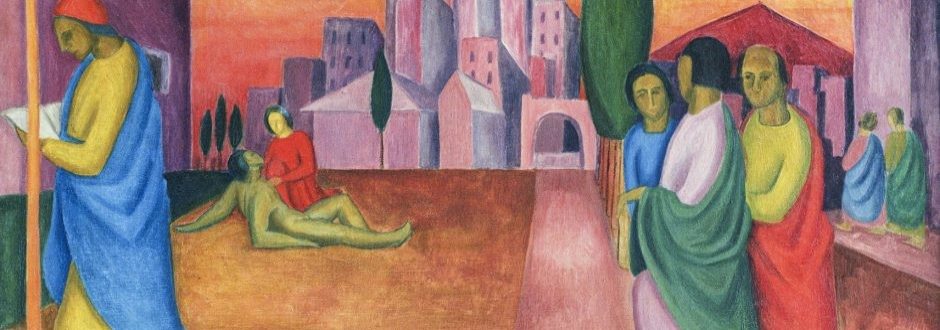The Parable of the Good Samaritan in Luke’s Gospel specifically opens our eyes to the experience of humanity from the perspective of compassion, calling us to action, writes Heather MacKenzie.
It took a pandemic to slowly peel back our layers of urban insularity. Until the first COVID-19 pandemic lockdown began, in streets all around Brisbane and other cities, often people didn’t know, or see any value in knowing, their neighbours’ names let alone the people behind their street numbers.
Life was no longer confined to what happened within our own backyard. There was, many discovered, a world out there and like the roots of trees in a great forest, we were intricately connected, each to the other. Who knew?
There have always been big “S” Samaritans amongst us. Those who work voluntarily with the homeless, the poor, the disadvantaged, with migrants and refugees, the down and outs. Compassion, whether Christ inspired or not, has engendered in these Samaritans a sense of response to community need. Not only feeling empathy for suffering but seeing a need and taking action to meet that need in practical ways.
They are the ones who cannot pass the woman sitting on a bench softly crying, the lost child or confused elder, the silent beggar, the down and out without stopping to help, to acknowledge their visibility. These are people who recognise social and racial prejudice, inequality or when simple acknowledgment is needed.
These are the ones who deliver meals to the frail elderly, take time to telephone the lonely stranger, visit the sick and the vulnerable understanding the answer to the question, “if not me, then who?” Not waiting for someone else to be the person to offer help.
The pandemic saw the rise of little “s” samaritans reaching out to elderly neighbours, learning the names of people in their street and former strangers, feeling a connectedness, a need to extend themselves beyond the former narrow trajectory of their lives. To notice rather than ignore and then to act.
Many of us come from an everyday ‘look the other way’ world. The current pandemic with all its restrictions, pain and loss has gifted to many fresh eyesight, fresh understanding that help is sometimes needed even when the question has not been asked. Called to pay attention we are learning to live outside ourselves and in community and to see just how world-wide is that community.
No longer seeing the distress of others as an opportunity to raise a mobile phone to take a picture to post on social media but to raise a hand to help. To not pass by an opportunity to do something for another without expectation of reward, recognition or recompense simply because it is the right thing to do. The face of a person in need is a mirror in which we see our own reflection.
Showing compassion only to ‘your own kind’ doesn’t cut it. Good, but the heart of the Parable of the Good Samaritan is showing compassion to everyone, to ‘the Other’ to ‘not my own kind’. Otherwise Luke 10: 25-37 would be known as the Parable of the Good but Picky Samaritan who only stopped to help a Samaritan in trouble on the road because he was one of his own kind. That would not have answered the tricky lawyer’s question and the question for our times, ‘just who is my neighbour?’
Such a story would not reach into our understanding to show a love that encompasses all, those who are same as us and not same as us. The Parable of the Good Samaritan challenges us to actively step outside comfort zones. To not look for clever arguments as to why engaging might not be the safest, wisest most personally advantageous response. To not view everyone as a probable Ted Bundy or a personal threat to the safety of a world constructed around the divisive ‘my kind’ and ‘the Other’, thereby giving you a free pass to bypass the troubled.
Life is a risk; loving is a risk but it has its own reward. Which, by the way, as a big or little letter Samaritan, you are not looking to earn as Reward Points.
This is not a system of merit accumulation, a box-ticking exercise to earn a card to pass Go and collect $200. Rather the Parable of the Good Samaritan is an illustrative lesson to answer: just who is my neighbour? Can I not pick and choose who falls into my personal category of ‘neighbour’ as I pick my Friends on Facebook? Gently but clearly we hear the answer to that question is you cannot.
The thing about compassion and love is the more you give away, the more you have. The universe bounces ‘right-back-atcha’. It is not enough to pray, to be seen to go to temple. Compassion is a practical, inclusive, hands-on expression of faith leading you away from the error of passing by.
Although all stories, parables and references in any Bible study of any persuasion are designed to open eyes to an experience of God, Luke’s parable specifically opens our eyes to the experience of humanity from the perspective of compassion. All parables tell us illustrative stories but this, the Parable of the Good Samaritan, is a story that could have been written for this season: vivid, simple to understand, rich but straightforward in meaning, clear in the universality of its truth. Painting a moral picture in colours as bright and clear as if it was just yesterday it was composed. There is no ambiguity in its message, it is a bell that rings out clear and high calling us to action. There is no better time than the current pandemic to open our eyes to see, our ears to hear, and to follow in the steps of the Good Samaritan.
‘Parable for a pandemic’ was highly commended in The Good Oil 2021 Writers’ Award.
